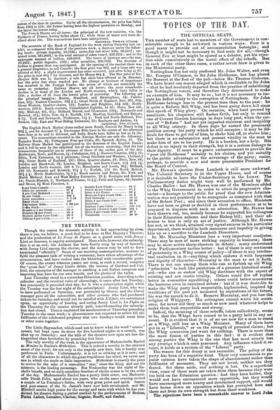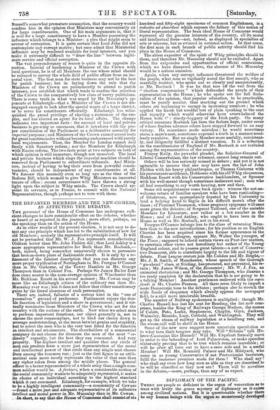TOPICS OF THE DAY.
THE OFFICIAL SEATS.
THE number of seats lost to members of the Government is con- siderable enough to be awkward in various ways. Four is a good many to provide out of accommodation boroughs and though it might not be necessary to find seats for all,—though General Fox at least might be spared as a debater, yet his rejec- tion adds cumulatively to the moral effect of the rebuffs. But in each of the other three cases, a rather severe blow is given to the Ministerial party. Nottingham has not only preferred Mr. John Walter, and even Mr. Feargus O'Connor, to Sir John Hobhouse, but has placed the Baronet at the foot of the poll—below Mr. Thomas Gisborne. We have heard one reason alleged which is creditable to Sir John —that he bad resolutely departed from the practice of subsidizing the Nottingham voters, and therefore they determined to make an example of him. It may be so ; but it is not necessarT to im- pute his defeat solely to the corruption of Nottingham. bir John Hobhouse belongs less to the present time than to the past: he is quite a Reform Bill Whig, and has been going down hill since that epoch of Whig glory. On occasion, when hard pressed by assailants, his eloquence still flashes forth, but only to remind one of Covent Garden hustings in days long past, when the suc- cess of " Reform " had not yet imparted staleness and insipidity to all Whig oratory. In those days he earned the prominent position among his party which he still occupies : it may be dif- ficult for them to get rid of him, to shake him off, to shelve him ; but there is no substantive and present vitality in the man to make him of use to his party. He is a burden, not a help. His defeat is no injury to their strength, but it is a serious damage to their dignity. It must be a grave embarrassment to provide for " poor old Hobhouse" suitably to his claims, and yet suitably to the public advantage or the advantage of the party; easier, perhaps, to provide a new and more presentable President for the Board of Control.
Mr. Hawes's ejection from Lambeth is still more awkward. The Colonial Secretary is in the Upper house, and of course it is desirable to have the Under-Secretary in the Lower. The Parliamentary duties might very well be performed by Mr. Charles Buller : but Mr. Hawes was one of the Members added to the Whig Government in order to attest its progressive cha- racter—a hostage to the public for proof that the new Adminis- tration was not positively to be retrograde as compared with that of Sir Robert Peel ; and since their accession to office, Ministers have not been so great or decided in their performances as to be prepared to dispense with such an attestation. Mr. Hawes has been thrown out, too, mainly because be supported his colleagues in their Education scheme and their Bishop bill ; and their ad- hesion to him is only an act of justice. Although Mr. Hawes has not, as we think, attained very signal success in his particular department, there would be both meanness and impolicy in giving him up as a sacrifice to the Lambeth Dissenters. In Mr. Macaulay Ministers lose a very important coadjutor. There may be men of more striking capacity in business; there may be more active sharp-shooters in debate ; many understand mere Parliamentary tactics better : but if there is any sentiment of generosity in a Whig course of policy—if there is any intellec- tual exaltation in it—anything which endows it with largeness and dignity of character—Macaulay is the man to set it forth. There is not one among them who can so furbish up old Whig "principles" to look like patriotism of a genuine historical stand- ard—who can so endow old Whig doctrines with the aspect of existing and not sterile vitality. Others could fire off replies better in committee squabbling; others could better manoeuvre the business even in sustained debate : but if it was desirable to make the Whig party look respectable, highminded, inspired by traditions of the past yet animated by aspirations of the future, his was the speech to do it. Remove Macaulay, and you lose the religion of Whiggery. His colleagues cannot waive his assist- ance, for never did they so much as now need whatever helps to make them look respectable and strong. Indeed, the meaning of these rebuffs, taken collectively, seems to be, that the Whigs have ceased to be a party held in any ac- count. It is evident that it is of no use now for a man to stand as a Whig, still less as a Whig Minister. Many of them have got in as "Liberals," or on the strength of personal claims ; but the Whig connexion just went for nothing. There is more than the mere fusion of parties in this fact : it is evident that among parties the Whig is the one that has most utterly lost any prestige which it once possessed. Any influence which it re- tains, it holds as a section of the "Liberal'' party. The reason for this decay is not recondite. The policy of the party has been of a negative kind. Their very concessions to po- pular opinion have taken the shape of abandonment rather than fulfilment of measures. They are not loved, neither are they feared. Set them aside, and nothing is lost. On a superficial view, some of these seats are taken from them because they were too bold on the Education question : had they been bolder, they would not have encountered more opposition, but they would have encouraged more hearty and determined support, and would have borne down an opposition which has prevailed here and there not from its own strength but from their weakness. The rejections have been a remarkable answer to Lord John
Russell's somewhat premature assumption, that the country would confirm him in the opinion that Ministers may conveniently sit for large constituencies. One of his main arguments is, that it is well for a large constituency to have a Member possessing the influence which belongs to a Minister : a plea that might seem to savour of corruption. It is quite certain that Lord John did not contemplate any corrupt motive ; but once admit that Ministerial influence may be rendered available for local interests, and you make it extremely difficult to " draw the line " between legiti- mate service and official corruption. The vast preponderancy of reason is quite in the opposite di- rection. Instead of burdening a Minister of the Crown with local questions, he is of all Members the one whose mind should be released to survey the whole field of public affairs from an im- perial view. The best man for state business may not be the best for parish business; but in laying down the rule that the Ministers of the Crown are preeminently to attend to parish interests, you establish that which tends to confine the selection of the Crown to the comparatively low class of vestry politicians. There is some truth in what was urged by Mr. Macaulay's op- ponents at Edinburgh—that a Minister of the Crown is not dis- engaged enough to look after the special wants of a large district, or to serve his constituents efficiently. Edinburgh has relin- quished the proud privilege of electing a statesman of the em- pire, and has elected an agent for its local affairs. The change indicates two important facts : the amount of local and private business is growing so enormous, that it interferes with the pro- per constitution of the Parliament as a deliberative assembly for imperial purposes; and Ministers of the Crown cannot accept seats for great constituencies without becoming embarrassed with purely local requirements. Thus, the Member for London cannot deal freely with Sanatory reform ; nor the Members for Edinburgh With Excise reform. The two facts point at two subjects on both of which opinion is still immature, though not unmoved. The local and private business which clogs the imperial machine should be removed from Parliament to subordinate tribunals. And Minis- ters, instead of having to beg their seats from powerful consti- tuencies, should be independent of any constituencies at all. We foresaw this necessity even so long ago as the time of the Reform Bill, which seemed to give Whig Ministers an immortal tenure of office : recent occurrences will have thrown a strong light upon the subject in Whig minds. The Crown should ap- point its servants, as in France, to consult with the National Representatives, though perhaps not to vote with them.



























 Previous page
Previous page